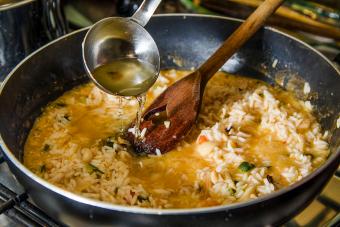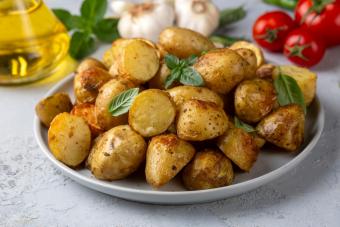
A splash of white wine is a staple in many classic French and Italian dishes. Whether you're making a glossy pan sauce, steaming mussels, or endlessly stirring a cozy butternut squash risotto, a bit of white wine pulls the dish together. So, you've started cooking and realize you don't have any white wine in the house…don't fret! These white wine substitutes for cooking will fill in seamlessly.
What You're Looking for in a White Wine Substitute When Cooking
First off, it helps to understand what characteristics you're looking for when reaching for a white wine substitute in the kitchen. A dry white wine adds acidity and a little extra pizazz to the overall flavor profile of a dish. Typically, as the wine cooks, it reduces to 50% or less. This concentrates the flavors and acidity while the majority of the alcohol burns off. The addition of wine to a dish can also be used to deglaze a pan, help to break down and tenderize tougher cuts of meat (thanks acid), or add a touch more moisture.
Best White Wine Substitutes for Cooking
You've started cooking and you go to reach for that leftover sauvignon blanc in the fridge from a couple nights go. Turns out your partner put the bottle back in the fridge empty…classic. There are more than a few substitutes that will provide similar punchy acidity and a bit of zip to whatever you're making.
| Subsitution | Notes |
|---|---|
| White wine vinegar + water or broth | Use equal amounts of lemon juice & water or broth. |
| Lemon juice + water | Use equal parts of each. |
| White grape juice + water + apple cider vinegar | Use equal parts of each. |
| Apple cider vinegar | Use as a direct substitution. |
| Dry white vermouth | Use only half the amount called for in place of wine. |
| Rice wine vinegar | Use as a direct substitution. |
| Water | Use as a direct substitution. Add a squeeze of lemon or a dash of white vinegar for a punch of acidity. |
| Chicken or vegetable broth | Use as a direct substitution. Add a squeeze of lemon or a dash of white vinegar for acidity, if desired. |
| Apple juice + white vinegar | Add just a splash of white vinegar to apple juice and use as an equal substitution. |
White Wine Vinegar
If you make your own salad dressings, you're likely to have a bottle of white wine vinegar in your cupboard. Because white wine vinegar is just white wine that has fermented again, its backbone flavor profile is similar to a white wine you may have used. In the case of white wine vinegar, it's got ripping acidity and no longer contains alcohol. It will give your dish all the tart, bright notes that white wine would have. It is however, vinegar, and therefore needs to be diluted by about 50% so it doesn't take over your dish. Use a 1:1 ratio of white wine vinegar and water or broth.
Lemon Juice
Need that acidic punch? Look no further than lemon juice. Fresh lemon juice eternally brightens up everything from poached fish to tahini sauces. Fresh squeezed is always best. If you don't believe me, do a taste test. However cute those little plastic lemon containers of juice may be, you'll find yourself trading up for the real thing. Lemons are SOUR, so you'll want to be sure to dilute the lemon juice with water. Use a 1:1 ratio of lemon juice and water as a substitute.
White Grape Juice
If you've got a jug of white grape juice in your fridge, pull it out. Even though the varieties of grapes used for making juice and wine are completely different, when it comes to cooking, the fruit profile each offers is interchangeable. Besides the lack of alcohol, one key difference is that white grape juice is significantly sweeter than a dry white wine. It's best to dilute with a bit of water and vinegar to be sure you'll get the desired acidity in your dish. You can start with a 1:1:1 ratio of white grape juice, water, and apple cider vinegar. If you want more flavor, lean into the juice. If you want more acid, go for a bit more of the apple cider vinegar.
Apple Cider Vinegar
Apple cider vinegar has got to be up there in terms of vinegar versatility. So of course it can happily sub in for white wine in the kitchen. It's got all the bright and tangy flavor from the fermented apples without the alcohol. Usually, you can use the same amount as you would white wine, but if you find apple cider vinegar to be on the strong side of sharp, then dilute it with a splash of water to mellow it out.
Dry White Vermouth
Making something that really needs that little kick of lingering alcohol? If you have a well-stocked bar cart, you'll have dry vermouth on hand. A fortified wine, vermouth is grounded by the original grape characteristics, but it's on steroids in terms of alcohol by volume or ABV. Because of the high alcohol content, you'll want to use a light hand. You'll likely only want to use half of the amount that the recipe calls for.
Rice Wine Vinegar
Rice wine vinegar is the perfect blend of noticeable acid mellowed by a subtle sweetness. It has a distinct characteristic to it that goes great with any kind of sautéed noodle or rice dish or things that highlight a sweet and sour profile. While the name suggestions otherwise, rice wine vinegar has nothing to do with wine. It's made from fermented rice and is probably more appropriately sometimes simply called rice vinegar. In any case, it can be a great substitute for white wine when cooking.
More White Wine Substitutes for Cooking
Along with the substitutions listed above, you can use any of the following:
- Water either alone or with just a splash of vinegar
- Broth, either alone or with a splash of vinegar
- Apple juice with a splash of vinegar
Swap It Out
Cooking with a dry white wine is great, but if you don't have any around, don't let it stop you from making that dreamy pot of pasta and clams or garlicky chicken. You probably have more than one of the above in your pantry of fridge that you can easily sub in.







